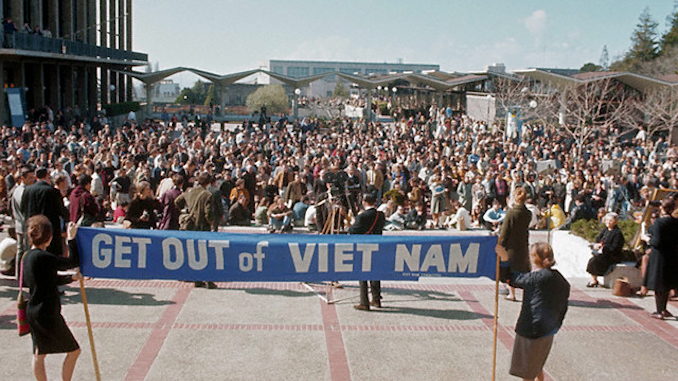
By Donald Jeffries
In the 1960s, there was a thriving, well-organized anti-war movement in this country. High profile politicians and major media figures eventually jumped on the bandwagon. It became popular to be against the Vietnam War. Unfortunately, that would be the only time in American history where an appreciable number of people, especially on the left, opposed any war.
During the Civil War, the Lincoln administration suspended the writ of habeas corpus, and simply rounded up any northerners who protested his policies, including the war. The New York draft riots were largely the result of angry Irish immigrants, who objected to serving in “a rich man’s war.” Many criticized the exemption created for those with enough wealth to pay a poorer man to take their place.
A good number of Americans were dubious about the United States entering the European conflict that became World War I. Few could understand why this country’s young men had to be sent in harm’s way because an archduke in Austria was assassinated. Propaganda utilizing the Uncle Sam figure, and disseminated by a pro-war media and celebrities like George M. Cohan, worked its magic, and the protesters who remained, like socialist Eugene Debs, were thrown in prison by the Wilson administration. The Supreme Court would uphold the constitutionality of what was in effect a revival of John Adams’ Alien and Sedition Acts.
The America First Committee largely consisted of classical liberals like John T. Flynn, who headed the New York chapter. Flynn’s career in the mainstream media was destroyed by a vengeful Franklin Roosevelt, who contacted major newspapers and magazines and urged them not to hire him.
The establishment press at the time began smearing the America First members as pro-Hitler or “Nazis.” Iconic aerial pioneer Charles Lindbergh was associated with the group, and his reputation suffered as a result. JFK’s father Joseph P. Kennedy was openly against us entering another European war, and accumulated many powerful enemies because of that, including FDR and Winston Churchill. When the Japanese attacked Pearl Harbor, practically all opposition to World War II vanished.
One notable exception was renowned literary figure Ezra Pound, who would be imprisoned after the war for making pro-Mussolini speeches in Italy. Pound was held for weeks in an open cage in the desert, and would subsequently be confined in St. Elizabeth’s mental hospital in Washington, D.C. for a decade.
There was no real opposition to the Korean conflict during the 1950s. However, a general concern on the left, inspired by the Beatnik generation, about the prospect of nuclear war emerged. The left at that time was silent about the Israeli treatment of Palestinians, and so were mainstream conservatives.
John F. Kennedy began his administration with a poetic but hardline Cold Warrior inaugural address. Kennedy would quickly turn towards peace, culminating in his June 10, 1963 speech at American University, which was unlike any other presidential address in American history. Many researchers believe that his firm commitment to withdraw all American forces from Vietnam by 1965 was the primary reason he was assassinated.
The Vietnam War became increasingly unpopular, especially with young people on college campuses. Counterculture figures like Jerry Rubin and Abbie Hoffman became media celebrities. Walter Cronkite, who shilled for the absurd official narrative of the JFK assassination until his dying day, began showing the carnage from the war on the nightly news, and was clearly sympathetic to those who wanted America to pull out. Hollywood and both print and electronic media were overwhelmingly supportive of the anti-war movement, and ridiculed Lyndon Johnson and especially Richard Nixon for escalating the fight.
The majority of those hippies who marched against the war, or burned their draft cards, would later become passionate cheerleaders for American meddling in other countries. Two notable examples of this were Bill and Hillary Clinton, who have never seen a war they didn’t love except for Vietnam.
Steven Smale was one of the leaders of the anti-war movement at its epicenter, UC Berkeley. But in 1991, he declared that he “feels differently” about the first Gulf War, and expressed his “qualified support” for it. Sounding much like neocon Bill Kristol, Smale stated, “We’ve got to keep them there because Iraq would take over Saudi Arabia. Bringing them home would give a victory to (Iraqi President Saddam) Hussein, which would be terrible. It would be like acceding to Hitler.”
Today’s “woke” left adores all wars as much as neocon conservatives do. Celebrity after celebrity tweets out “I stand with Ukraine.” Vladimir Putin, the latest foreign bogeyman, is as despised by our state-controlled media as much as Donald Trump is. The present generation would clearly be just as willing to plant Victory Gardens and buy bonds or promote freedom fries.
In America, war has always been more popular than peace.





